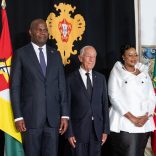Mozambique and Angola deepen economic and cultural cooperation
Mozambique: Net reserves rose to $3B in July, still cover three months’ imports

File photo: Lusa
Mozambique’s Net International Reserves (NIR) totalled $3.028 billion (€2.826 billion) in July, up 10% since January, but still guaranteeing three months of estimated needs for imports of goods and services.
According to data from a monthly statistical report by the central bank, the Bank of Mozambique, consulted on Monday by Lusa, these reserves had totalled $2.763 billion (€2.579 billion) at the beginning of January 2023.
The NIRs controlled by the Bank of Mozambique, according to the same report, were sufficient in August to guarantee 3.19 months of total imports and 3.91 months “excluding major projects” currently underway.
In the 2023 state budget, it notes, Mozambique’s government set the goal of building up Net International Reserves of 2,936.6 million dollars (2,686 million euros), “corresponding to three months of coverage of imports of non-factorial goods and services.”
Mozambique’s international reserves have been falling since 2021, the International Monetary Fund announced in July.
In its report on the final approval of the review of the Extended Credit Facility (ECF) for Mozambique, the IMF said that the country’s gross international reserves covered almost 4.3 months of imports at end-2022 – above the commonly recommended minimum buffer of at least three months – but that the reserves have been “falling since the beginning of 2021” to $2.900 billion (€2.580 billion) at the end of last year.
The IMF recognised the impact on Mozambique’s international reserves of the “high costs” of fuel imports, given the resulting need to supply more foreign currency to the main fuel importers.
“At the same time, imports not related to megaprojects have increased significantly in the last two years, further reducing the import coverage of reserves,” the IMF document notes.
In January, the Bank of Mozambique increased the ratio of mandatory reserves to foreign demand deposits from 11.5% to 28%, and in April it reduced the supply to fuel importers from 100% to 60%, it recalls in Monday’s report.
The announcement of the IMF’s approval of this revision to the ECF was made on 6 July, guaranteeing a disbursement to Mozambique of $60.6 million (€54 million), the report also confirms.
In the note that accompanied the announcement of the second review of the programme approved in May 2022, and which brings the total amount already received by Mozambique to $212.09 million (€194 million), out of a total of $456 million (€418 million), the IMF says that it allowed two criteria to be overlooked: the primary budget balance at the end of last year and the accumulation of external debts by the public sector.
In its macroeconomic forecasts for this year, the IMF expects growth in Mozambique’s gross domestic product to accelerate to 7% this year from from 4.2% lats, and forecasts that by the end of the year inflation will have fallen to 6.7% from 10.3% – so back down to a similar level as in 2021, but still almost double the rate registered in the previous two years.
The ratio of public indebtedness to GDP is expected to continue its downward trajectory and reach 89.7% by the end of this year, an improvement on last year’s 95.5%.












Leave a Reply
Be the First to Comment!
You must be logged in to post a comment.
You must be logged in to post a comment.